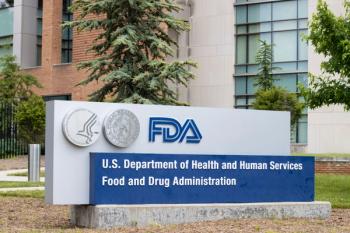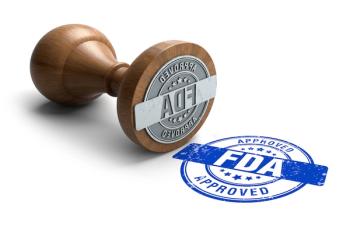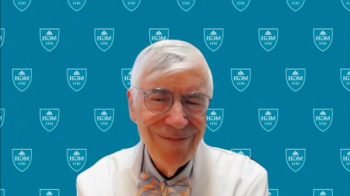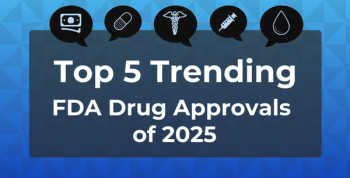
FDA Approves Liso-Cel to Treat R/R Mantle Cell Lymphoma
Mantle cell lymphoma is the fourth subtype of non-Hodgkin lymphoma that can be treated with this CAR T-cell therapy.
Bristol Myers Squibb
MCL is a less common form of non-Hodgkin lymphoma with fewer treatment options, and many patients relapse after receiving initial treatments. At present, MCL is considered incurable, as response rates tend to decline with each subsequent treatment.
"Mantle cell lymphoma is a very complex disease, because it's an incurable disease, but also because there are a variety of treatment options and treatment strategies," Christopher Flowers, MD, division head in the Division of Cancer Medicine at MD Anderson Cancer Center, and chair and professor of the Department of Lymphoma/Myeloma at The University of Texas MD Anderson Cancer Center, told The American Journal of Managed Care® in an interview. "Some of the older strategies, historically, have been to give high-dose and intensive therapy, and then to follow that [with] an autologous transplant, and then to hope that patients have a very long remission from that first therapy and don't need another therapy for many years or even decades."
Liso-cel is a chimeric antigen receptor (CAR) T-cell therapy that targets CD-19 which has already been approved in 3 other subtypes of non-Hodgkin lymphoma: large B-cell lymphoma,2 follicular lymphoma,3 and chronic lymphocytic leukemia.4 The therapy has a different manufacturing process from first-generation CAR T-cell products, which experts say
As with other CAR T-cell therapies, liso-cel is administered as a one-time infusion, with a single dose containing 90 to 110 x 106 CAR-positive viable T cells.
Bristol Myers Squibb (BMS), the maker of liso-cel highlighted the administration of the treatment in both the inpatient and outpatient setting in the TRANSCEND NHL 001 trial. According to Flowers, that is an important component of making liso-cel accessible for more patients.
"That component of access makes this also an important new advance to see that patients were treated in community based practices, where they can receive cellular therapies," he said.
In its statement, BMS said it had made investments in boosting manufacturing capacity and “is prepared to meet demand” for liso-cel. Some leading physicians have criticized manufacturers of CAR T-cell therapies for
Deciding which therapy to give patients with MCL and how to sequence therapies is among the many challenges in treating patients with MCL.
“There have been few advances in the treatment of relapsed or refractory MCL, and prognosis worsens for patients after each subsequent relapse, often leaving them with high disease burden and difficulty achieving deep and durable responses,” Michael Wang, MD, lead investigator and Puddin Clarke Endowed Professor, Department of Lymphoma and Myeloma, Division of Cancer Medicine, University of Texas MD Anderson Cancer Center, Houston, Texas, said in the statement. “The approval of [liso-cel] offers an important new CAR T treatment option with high rates of lasting responses and a consistent safety profile, which is critically important for these patients who currently have limited options to treat this aggressive disease.”
FDA’s approval of liso-cel for patients with R/R MCL is based on results from of
Median time to response was 1 month (range: 0.7-3 months) and median duration of response was 13.3 months (95% CI: 6.0-23.3 months) with a median follow-up of 22.2 months (95% CI: 16.7-22.8 months). More than half (51.4%; 95% CI: 37.5-63.7) of responders remained in response at 12 months, and 38.8% (95% CI: 25-52.4) of responders remained in response at 18 months.
Results from the primary analysis, published in the Journal of Clinical Oncology, (n = 83; DL1 + DL2) showed an overall response rate of 83.1% (95% CI: 73.3-90.5) and a CR rate of 72.3% (95% CI: 61.4 to 81.6). Median duration of response was 15.7 months (95% CI: 6.2 to 24.0) and progression-free survival was 15.3 months (95% CI: 6.6 to 24.9).
Safety results show a consistent profile across clinical trials (n=702) with any grade CRS occurring in 54% of patients, including grade >3 CRS in 3.2% of patients. The median time to the onset of CRS was 5 days (range: 1 to 63 days). Neurologic events (NEs) of any grade were reported in 31% of patients, including grade >3 in 10% of patients. The median time to onset of NEs was 8 days (range: 1 to 63 days), and resolved in 88% of patients with a median duration of 7 days (range: 1 to 119 days).
"We will need to see over time how durable those responses are, but I think we've seen from other settings with CAR T-cell therapy, that [it] can [have] meaningful and quite durable responses that really create great new options for patients," Flowers said.
Patients receiving liso-cel can receive the therapy on an outpatient basis; patients in the MCL cohort of the TRANSCEND NHL 001 study were treated on both an inpatient and outpatient basis.
“The approval of [liso-cel] brings a new CAR T cell therapy option to patients battling relapsed or refractory MCL,” said Meghan Gutierrez, chief executive officer, Lymphoma Research Foundation. “Each advance in treatment represents important progress in improving outcomes for patients, and this news builds upon this progress with a new potentially transformative treatment where there are currently limited options. We are thankful for the families and the researchers involved in making this approval a reality for those living with this disease.”
BMS officials say liso-cel “is broadly covered by commercial and government insurance programs in the U.S.,” and that the company also offers programs for patients and caregivers to grant access.
References
1. US Food and Drug Administration approves Bristol Myers Squibb's Breyanzi as a new CAR T cell therapy for relapsed or refractory mantle cell lymphoma. News release. Bristol Myers Squibb. May 30, 2024. Accessed May 30, 2024.https://news.bms.com/news/corporate-financial/2024/U.S.-Food-and-Drug-Administration-Approves-Bristol-Myers-Squibbs-Breyanzi-as-a-New-CAR-T-Cell-Therapy-for-Relapsed-or-Refractory-Mantle-Cell-Lymphoma/default.aspx
2. Caffrey M. FDA approves less toxic liso-cel in R/R large B-cell lymphoma. AJMC®. February 5, 2021. Accessed May 30, 2024. https://www.ajmc.com/view/fda-approves-less-toxic-liso-cel-in-r-r-large-b-cell-lymphoma
3. Steinzor P. FDA grants accelerated approval for liso-cel for R/R follicular lymphoma. AJMC. May 16, 2024. Accessed May 30, 2024. https://www.ajmc.com/view/fda-grants-accelerated-approval-for-liso-cel-for-r-r-follicular-lymphoma
4. Caffrey M. FDA grants accelerated approval to liso-cel for CLL/SLL after BTK, BCL-2 inhibitors. AJMC. March 14, 2021. Accessed May 30, 2024. https://www.ajmc.com/view/fda-grants-accelerated-approval-to-liso-cel-for-cll-sll-after-btk-bcl-2-inhibitors
5. Caffrey M. Interview: Tanya Siddiqi, MD, discusses the promise of reduced toxicity with liso-cel. Am J Manag Care. 2021;27(2 suppl):SP52.
6. Abramson JS, Palomba ML, Gordan LI, et al. Lisocabtagene maraleucel for patients with relapsed or refractory large B-cell lymphomas (TRANSCEND NHL 001): a multicentre seamless design study. Lancet. 2020;396(10254):839-852. doi:10.1016/S0140-6736(20)31366-0
Newsletter
Stay ahead of policy, cost, and value—subscribe to AJMC for expert insights at the intersection of clinical care and health economics.








